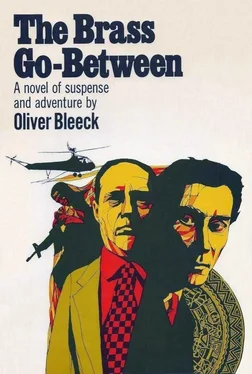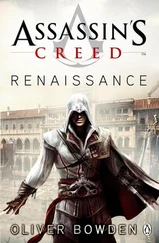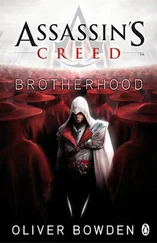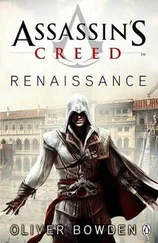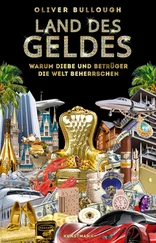Oliver Bleeck - Brass Go-Between
Здесь есть возможность читать онлайн «Oliver Bleeck - Brass Go-Between» весь текст электронной книги совершенно бесплатно (целиком полную версию без сокращений). В некоторых случаях можно слушать аудио, скачать через торрент в формате fb2 и присутствует краткое содержание. Город: New York, Год выпуска: 1969, Издательство: William Morrow, Жанр: Детектив, на английском языке. Описание произведения, (предисловие) а так же отзывы посетителей доступны на портале библиотеки ЛибКат.
- Название:Brass Go-Between
- Автор:
- Издательство:William Morrow
- Жанр:
- Год:1969
- Город:New York
- ISBN:нет данных
- Рейтинг книги:3 / 5. Голосов: 1
-
Избранное:Добавить в избранное
- Отзывы:
-
Ваша оценка:
- 60
- 1
- 2
- 3
- 4
- 5
Brass Go-Between: краткое содержание, описание и аннотация
Предлагаем к чтению аннотацию, описание, краткое содержание или предисловие (зависит от того, что написал сам автор книги «Brass Go-Between»). Если вы не нашли необходимую информацию о книге — напишите в комментариях, мы постараемся отыскать её.
Brass Go-Between — читать онлайн бесплатно полную книгу (весь текст) целиком
Ниже представлен текст книги, разбитый по страницам. Система сохранения места последней прочитанной страницы, позволяет с удобством читать онлайн бесплатно книгу «Brass Go-Between», без необходимости каждый раз заново искать на чём Вы остановились. Поставьте закладку, и сможете в любой момент перейти на страницу, на которой закончили чтение.
Интервал:
Закладка:
I was not as blasé about the suitcase and its contents as I had pretended to be before Frances Wingo. Despite inflation, a quarter of a million dollars was still a fortune to me, an immense one, and I was always amazed that those who used my services could raise such staggering sums so easily. If someone were to kidnap my kindergarten-bound son, I could, thanks to the check from the Coulter Museum, scrape up fifteen thousand, but not a dime more. My son, it seemed, was safe unless his new stepfather turned out to be embarrassingly wealthy which, knowing my ex-wife, was not at all unlikely.
I took the suitcase out of the tub and carried it to the bed. The case wasn’t locked so I opened it and stood there for long moments staring at a quarter of a million dollars in used tens and twenties, all carefully wrapped in brown paper bands which said that each bundle contained five hundred dollars. I didn’t count it. I didn’t even touch it. Winfield Spencer’s Washington bank had already counted it and when it comes to sums like that, banks make no mistakes.
At four o’clock I drove out of the Avis garage in a rented four-door Plymouth, and fought my way to the New Jersey Turnpike which is, in my opinion, the most unlovely strip of superhighway in the nation. It’s also a road that demands grim defensive driving unless you have a very strong death wish, which will be happily fulfilled by either members of the Teamsters Union who like to let their twenty tons of steel nibble at your rear bumper or by the lane jumpers who flit back and forth, oblivious of their rear-view mirrors, ignorant of their directional signals. Most of the vehicles, I noticed, wore New Jersey license plates.
At 5:15 I turned into the third Howard Johnson motel and restaurant which, like the rest of its breed, was all orange and white and dyspeptic-looking. I was handed a key to room 143 in exchange for $16 plus tax, got back in the car, drove past 143, and parked in front of 135. I unlocked the trunk, took out the suitcase, and walked back to 143. There was nothing in the motel room that I hadn’t expected. There was a bed and a dresser and some chairs and a 21-inch television set (black and white) and some lamps and a carpet. Everything was either nailed down or securely fastened so that it couldn’t be carted off at three o’clock in the morning. I looked in the bathroom and saw that it contained the usual equipment fashioned out of bright blue tile. I came out of the bathroom and placed the suitcase in a closet. Then I stretched out on the bed and waited for the phone to ring so that I could give somebody a quarter of a million dollars in exchange for a 68-pound brass shield that was at least 1,000 years old or older, or about as old as I felt.
When the phone rang I looked at my watch. It was exactly six o’clock and the voice on the phone belonged to the woman who had called me what now seemed to be a long time ago, a couple of years back, at the Madison Hotel in Washington. She then had sounded as if she were reading the words that she had to say to me, but now the conversation was informal, almost chatty.
“You follow instructions very well, don’t you, Mr. St. Ives?”
“What about the shield?”
“Is that really money in the suitcase that you carried into your room?”
“It’s money.”
“It’s such a lot of money, isn’t it?”
“The shield,” I said.
She giggled then. It was a high-pitched giggle that went on for a long time and made her sound like a preadolescent girl who has heard her first dirty joke and found it to be quite funny. “The shield of Komp-o-reen.” She had lowered her voice and tried to make it as dramatic as possible, but she wasn’t a very good actress and the effect wasn’t humorous, only embarrassing, which she seemed to realize because she giggled again.
“The shield,” I said, as patiently as I could, as if talking to a drunken friend who thought it would be a splendid idea to seek out some after-hours joints now that it was four o’clock in the morning and the bars were closed.
She said something then, not to me, but to someone else who was there with her wherever she was, next door in room 141 for all I knew. I couldn’t understand what she said, but when she came back on the phone, she sounded as if she were reading again, although her voice was a little more singsong than before, as though she was trying to burlesque the whole thing.
“The exchange will not be made tonight. You will go to Washington tomorrow and check into the Madison Hotel by noon. At twelve-thirty you will receive further instructions. Do you want this repeated?”
“No,” I said. “I don’t want it repeated; all I want is the shield.”
“Tomorrow, Mr. St. Ives,” she said, again bringing her voice down into that pseudodramatic register. “Tomorrow you will have the shield of Komp-o-reen.” Then she giggled again for what seemed to be a long time and hung up.
I sat there on the edge of Mr. Howard Johnson’s overly soft bed and wondered if I was too old to enroll in an International Correspondence School course, one that would teach me to be a bookkeeper or a draftsman or a sheet-metal mechanic. Earn big pay. Learn in your spare time. That was something that I had a lot of. I had eighteen hours before I had to be in Washington, before I had to talk to Giggles again or to her friend with the cottony voice. I could probably get halfway through lesson one before then.
I tried to recall the woman’s voice. It hadn’t been Bryn Mawr nor had it been East Side New York nor magnolia southern. It was just the voice of some female who probably had made it through high school and who thought that $250,000 was a great deal of money and who was willing to be mixed up in two or three murders to make sure that she got her share.
The giggle bothered me. I had heard people giggle like that before when they were high on pot or heroin, although with heroin there usually were more beatific smiles than giggles. Or she could have been slightly drunk except that there had been no slur in her voice, that voice with the all-American California-Midwest accent which could have belonged to someone who was 20 or 30 or a what-the-hell 40.
I took some foresight out of my jacket pocket, a half pint of J&B, and went into the bathroom where I struggled with the sanitary wrapping on a water glass. I poured some of the whisky into the glass, added water, went back into the bedroom, checked the closet to make sure that the suitcase was still there, and sat back down on the edge of the bed to brood some more.
The thieves could have worked it a half-dozen ways, I decided. Both of them could have followed me from New York and called from a pay phone. Or they could have checked into the motel that morning and watched me arrive. Or one of them, the man with the voice that sounded as if he had a mouthful of Band-Aids, could have sat in a parked car, followed my movements through his sunglasses, called the woman, and had her telephone me from their twelve-room duplex on East 62nd Street where she lolled around on the chaise longue while eating hashish-flavored bonbons. Only that didn’t wash because she had talked to somebody when she called me, and it was probably the man with the cottony voice. Or the cat.
My theories had all the substance of a badly spun cobweb so I put down my drink, picked up the phone, and placed a long-distance call to Frances Wingo in Washington. When she came on I said, “This is Philip St. Ives. It was a dry run.”
“You didn’t get the shield?”
“No.”
“But you still have the money?”
“Yes, I still have it.”
“What happened?”
“They tested me to see how well I follow instructions. They’re to get in touch by twelve-thirty tomorrow in Washington at the Madison Hotel. You can do me a favor and make me a reservation.”
Читать дальшеИнтервал:
Закладка:
Похожие книги на «Brass Go-Between»
Представляем Вашему вниманию похожие книги на «Brass Go-Between» списком для выбора. Мы отобрали схожую по названию и смыслу литературу в надежде предоставить читателям больше вариантов отыскать новые, интересные, ещё непрочитанные произведения.
Обсуждение, отзывы о книге «Brass Go-Between» и просто собственные мнения читателей. Оставьте ваши комментарии, напишите, что Вы думаете о произведении, его смысле или главных героях. Укажите что конкретно понравилось, а что нет, и почему Вы так считаете.
